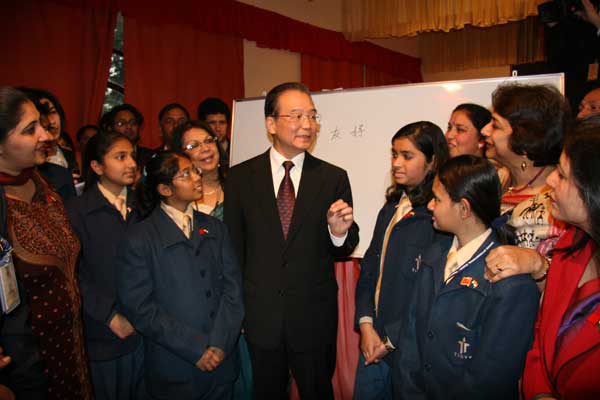Foreign and Military Affairs
World is big enough for China and India to grow
Updated: 2010-12-16 07:34
By Li Xiaokun, Li Xiang and Ai Yang (China Daily)
 |
|
Premier Wen Jiabao talks with teachers and students at the Tagore International School in New Delhi on Wednesday during his three-day visit to India. [Photo/China Daily] |
NEW DELHI / BEIJING - China and India's future prosperity lies in partnership not rivalry, Premier Wen Jiabao said on Wednesday, promising to redress a yawning trade imbalance between the rapidly growing Asian giants.
Wen, making his first visit to India in five years, came as the head of a 400-strong delegation of Chinese business leaders seeking to boost trade ties and ease tensions in a relationship long marked by mutual suspicion.
Unlike the package US President Barack Obama and French President Nicolas Sarkozy signed during their visits to India earlier this year, which both exceeded $10 billion, the agreements with China will leave most of the money in India, instead of asking New Delhi to buy foreign goods, a source at the Foreign Ministry told China Daily.
The source, who declined to be named, said the deals will largely focus on investment, the construction of infrastructure and the purchase of Indian products.
China is India's largest trading partner. The value of bilateral trade is expected to reach $60 billion this year, a 30-fold increase since 2000.
Yet Wen said this is insufficient, adding that he and his Indian counterpart, Manmohan Singh, will discuss substantially increasing bilateral trade during his visit.
He called on New Delhi to discuss expanding cooperation in the areas of tourism, energy and green technology.
The premier also dismissed India's concern that China is trying to shut Indian companies out of the Chinese market.
Bilateral balance of trade is heavily in China's favor. India's trade deficit with China rose from $1 billion in 2001-2002 to $16 billion in 2007-2008.
The Hindustan Times said earlier this week that India is expected to urge China to let its IT and pharmaceutical companies have a bigger share of the Chinese market.
"China attaches great importance to the trade imbalance between the two nations," Wen said. "We'd like to help India's IT, pharmaceutical and agricultural products get into the Chinese market."
Some media have compared the two nations to a dragon and an elephant competing with each other, a notion Wen said he disagrees with.
"The world has enough room for the development of both China and India, as well as their cooperation."
"The Indian people used to be scared of China's growing power. But the mindset of many Indian businessmen has started to change," Bijendra Singh, an Indian television reporter, told China Daily.
"With such a big delegation, the premier's visit is definitely going to bring the relationship closer together."
Wen later visited the Tagore International School in the Indian capital, where he chatted with students and teachers and gave a lesson on Chinese calligraphy.
"I was touched by the children here who called me 'Grandpa Wen' because that's what the Chinese children call me at home," he said.
Wen said he was pleased to learn that the school will introduce Chinese to its curriculum in April, as "language is a tool for heart-to-heart communication", which he believes will help strengthen ties between the two countries.
Wen will have a tight schedule on Thursday, when he is due to meet Indian President Pratibha Patil, Prime Minister Singh and the ruling Congress party chief Sonia Gandhi, as well as to speak to a think tank about Beijing's policies on India.
China's manufacturing and infrastructure industries, together with India's IT, biochemistry and outsourcing industries, leave plenty of room for complementary trade development, said Hua Junduo, former Chinese ambassador to India.
However, the Sino-Indian relationship has been viewed by some as a mixture of "third-world solidarity and strategic rivalry", with the need for the two to balance each other's growing power, Jean Pierre Cabestan, a professor of international relations at Hong Kong Baptist University, told Reuters earlier this week.
Lou Chunhao, a professor of South Asian studies at the China Institutes of Contemporary International Relations, disagreed.
Despite lingering disputes between the two countries, China is trying its best to seek a win-win solution with India, he said.
"Wen's large delegation to India is a testament to that."
Yu Yang and AFP contributed to this story
E-paper

Ear We Go
China and the world set to embrace the merciful, peaceful year of rabbit
Preview of the coming issue
Carrefour finds the going tough in China
Maid to Order
Specials

Mysteries written in blood
Historical records and Caucasian features of locals suggest link with Roman Empire.

Winning Charm
Coastal Yantai banks on little things that matter to grow

New rules to hit property market
The State Council launched a new round of measures to rein in property prices.




